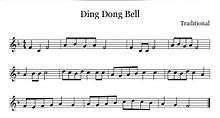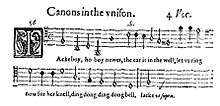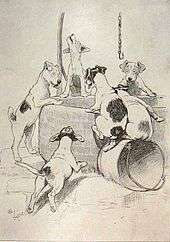Ding Dong Bell
"Ding Dong Bell" or "Ding Dong Dell" is a popular English language nursery rhyme. It has a Roud Folk Song Index number of 12853.
| "Ding Dong Bell" | |
|---|---|
 Sheet music | |
| Nursery rhyme | |
| Published | 1580 |
| Songwriter(s) | Unknown |
Lyrics
The most common modern version is:
Ding, dong, bell,
Pussy’s in the well.
Who put her in?
Little Johnny Flynn.
Who pulled her out?
Little Tommy Stout.
What a naughty boy was that,
To try to drown poor pussy cat,
Who never did him any harm,
But ate all of the mice in the farmer's barn.[1]
Origins

The earliest recorded reference to the rhyme is from John Lant, the organist of Winchester Cathedral in 1580, who recorded the following rhyme:
Jacke boy, ho boy newes,
The cat is in the well,
Let us ring now for her Knell,
Ding dong ding dong Bell.[1]
It was printed in Thomas Ravenscroft's Pammelia, Musicks Miscellanie in 1609, as a canon for four voices.[2]
The phrase 'Ding, dong, bell' also appears in these passages of Shakespeare's plays:
The Tempest, Act I, Scene II:
Sea nymphs hourly ring his knell:
Hark! Now I hear them - Ding, dong, bell.
The Merchant of Venice, Act III, Scene II:
Let us all ring fancy's knell;
I'll begin it - Ding, dong, bell.
The earliest version to resemble the modern one is from Mother Goose's Melody published in London around 1765.[1] The additional lines that include (arguably) the more acceptable ending for children with the survival of the cat are in James Orchard Halliwell's Nursery Rhymes of England, where the cat is pulled out by "Dog with long snout".[3]
Several names are used for the malevolent Johnny Green, including Tommy O' Linne (1797) and Tommy Quin (c. 1840).[1] Iona and Peter Opie suggested that it may have had its origins in Tom a lin or Tom o' Lin, the protagonist of another nursery rhyme.[1]
William Stonard's composition
There is also a version composed as a four-part round by William Stonard (1585-1630) to the following text:
Ding, ding, ding dong bell, ding, ding, ding, ding dong bell.
Oh cruel death that stopped the breath of him I loved so well.
Alack and well away 'tis a heavy day that ever us befell.
Then for his sake some order let us take that we may ring his knell.
Reformed versions

The most common modern version is arguably already a moderation of the theme of the original rhyme. The fear that children might be affected by the violence of the rhyme and specifically that children might be tempted to put cats in wells, led to several attempts to reform the rhyme.[1] In his New Rhymes for Old (1949) Geoffrey Hall published the following alternative:
Ding dong bell,
Pussy's dead in the well
Who let her die?
Little Johnny Fin
Who Got her alive?
Little Tommy Thin.
What a bad boy was that
To kill a pussy cat.
Who never did any harm,
But played with the mice in his father's barn.[1]
A modern version replaces the word "pussy" with "kitty".
References
- I. Opie and P. Opie, The Oxford Dictionary of Nursery Rhymes (Oxford: Oxford University Press, 1951, 2nd edn., 1997), p. 149.
- T. Ravenscroft, Selections from the works of Thomas Ravenscroft Roxburghe Club, 1822.
- "Ding Dong Bell". TwinkleTrax Children's Songs. 2012. Retrieved 13 May 2012.CS1 maint: ref=harv (link)